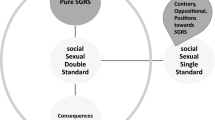Abstract
The current study is a community-based research project identifying ways to better define and support sexual well-being of college students on campus. The data explore how students self-define their own sexual well-being, how it relates to access of the institution’s health and counseling services, as well as how it relates to physiological, emotional, relational, and social factors. From in-depth individual interviews, the study compares individual students’ varying perspectives of their own sexual well-being situated within the campus community. Results from thematic analysis show that definitions of sexual well-being are multifaceted—ranging from sex positive, behavioral, mental and emotional, social identity-related, relational, and related to campus resources. Our findings can be used to inform sexual health education and services offered to college students.
Similar content being viewed by others
References
Aggleton, P., de Wit, J., Myers, T., & Du Mont, J. (2014). New outcomes for sexual health promotion. Health Education Research,29(4), 547–553.
Anderson, R. M. (2013). Positive sexuality and its impact on overall well being. Bundesgesundheitsblatt-Gesundheitsforschung-Gesundheitsschutz,56(2), 208–214.
Bersamin, M., Fisher, D. A., Marcell, A. V., & Finan, L. J. (2017). Reproductive health services: Barriers to use among college students. Journal of Community Health,42(1), 155–159.
Braun, V., & Clarke, V. (2012). Thematic analysis. In H. Cooper, P. M. Camic, D. L. Long, A. T. Panter, D. Rindskopf, & K. J. Sher (Eds.), APA handbook of research methods in psychology, Vol. 2. Research designs: Quantitative, qualitative, neuropsychological, and biological (pp. 57–71). Washington, DC: American Psychological Association.
Contreras, D., Lillo, S., & Vera-Villarroel, P. (2016). Subjective sexual well-being in Chilean adults: Evaluation of a predictive model. Journal of Sex and Marital Therapy,42(4), 338–352.
Daugherty, T. K., Julian, H. M., Lynch, N. M., Chen, S. J., Whipple, T. L., & Ginsburg, A. F. (2017). Beyond the absence of disease or infirmity: The case for sexual wellness. College Student Journal,50(3), 404–408.
Doty, N., Willoughby, B., Lindahl, K., & Malik, N. (2010). Sexuality related social support among lesbian, gay, and bisexual youth. Journal of Youth and Adolescence,39(10), 1134–1147.
Eisenberg, M., Garcia, C., Frerich, E., Lechner, K., & Lust, K. (2012). Through the eyes of the student: What college students look for, find, and think about sexual health resources on campus. Sexuality Research and Social Policy,9(4), 306–316.
Espinosa-Hernández, G., Vasilenko, S. A., McPherson, J. L., Gutierrez, E., & Rodriguez, A. (2017). Brief report: The role of three dimensions of sexual well-being in adolescents’ life satisfaction. Journal of Adolescence,55, 61–65.
Flanders, C. E., Pragg, L., Dobinson, C., & Logie, C. (2017). Young sexual minority women’s use of the internet and digital technologies for sexual health information seeking. Canadian Journal of Human Sexuality,26(1), 17–25.
Hogben, M., Ford, J., Becasen, J. S., & Brown, K. F. (2015). A systematic review of sexual health interventions for adults: Narrative evidence. Journal of Sex Research,52(4), 444–469.
Hooghe, M. (2012). Is sexual well-being part of subjective well-being? An Empirical Analysis of Belgian (Flemish) Survey Data Using an Extended Well-Being Scale. Journal of Sex Research,49(2–3), 264–273.
Lechner, K., Garcia, C., Frerich, E., Lust, K., & Eisenberg, M. (2013). College students’ sexual health: Personal responsibility or the responsibility of the college? Journal of American College Health,61(1), 28–35.
Logie, C., Lacombe-Duncan, A., Weaver, J., Navia, D., & Este, D. (2015). A pilot study of a group-based HIV and STI prevention intervention for lesbian, bisexual, queer, and other women who have sex with women in Canada. AIDS Patient Care and STDs,29(6), 321–328.
Mark, K. P., Garcia, J. R., & Fisher, H. E. (2015). Perceived emotional and sexual satisfaction across sexual relationship contexts: Gender and sexual orientation differences and similarities. The Canadian Journal of Human Sexuality,24(2), 120–130.
Ogletree, S. M., Fancher, J., & Gill, S. (2014). Gender and texting: Masculinity, femininity, and gender role ideology. Computers in Human Behavior,37, 49–55.
Pascoal, P. M., Narciso, I. D. S. B., & Pereira, N. M. (2014). What is sexual satisfaction? Thematic analysis of lay people’s definitions. Journal of Sex Research,51(1), 22–30.
Rubinsky, V., & Cooke-Jackson, A. (2018). Sex as an intergroup arena: How women and gender minorities conceptualize sex, sexuality, and sexual health. Communication Studies,69(2), 213–234.
Stephenson, K., & Meston, C. (2015). The conditional importance of sex: Exploring the association between sexual well-being and life satisfaction. Journal of Sex and Marital Therapy,41(1), 25–38.
World Health Organization. (2006). Defining sexual health: Report of a technical consultation on sexual health. 28–31 January 2002 Sexual Health Document Series. Geneva, Switzerland: Special Programme of Research, Development, and Research Training in Human Reproduction.
Wylie, K. (2010). Sex education and the influence on sexual wellbeing. Procedia – Social and Behavioral Sciences,5, 440–444.
Author information
Authors and Affiliations
Corresponding author
Ethics declarations
Conflict of interest
All of the authors declare that we have no conflicts of interests.
Ethical Approval
All procedures performed in studies involving human participants were in accordance with the ethical standards of the institutional and/or national research committee and with the 1964 Helsinki declaration and its later amendments or comparable ethical standards.
Informed Consent
Informed consent was obtained from all individual participants included in the study.
Additional information
Publisher's Note
Springer Nature remains neutral with regard to jurisdictional claims in published maps and institutional affiliations.
Rights and permissions
About this article
Cite this article
Bedree, H., Moller-Mullen, M., Rose, E. et al. Sexual Well-Being Among College Students: A Qualitative Study. Sexuality & Culture 24, 140–156 (2020). https://doi.org/10.1007/s12119-019-09631-5
Published:
Issue Date:
DOI: https://doi.org/10.1007/s12119-019-09631-5



